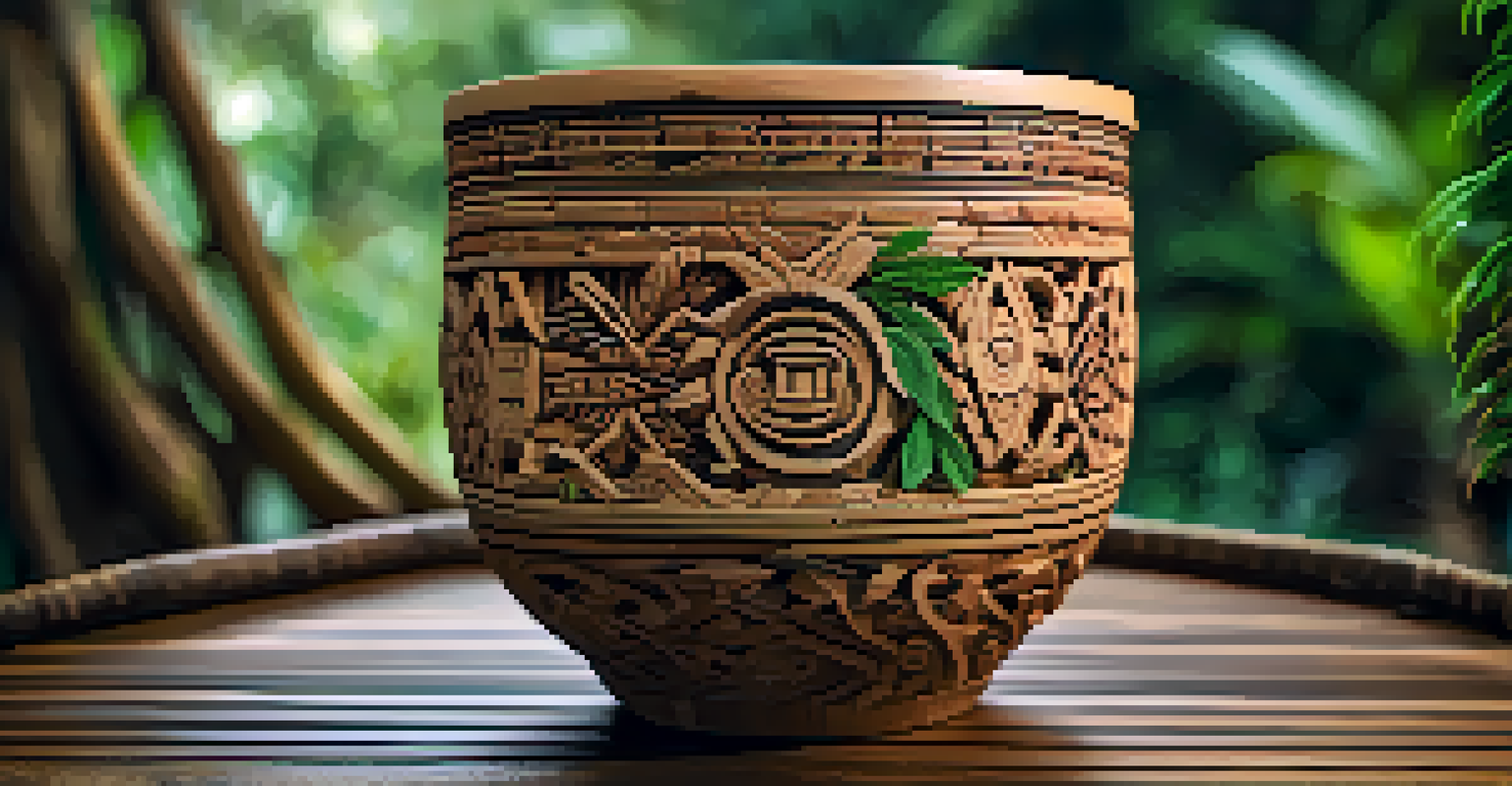The Ethics of Ayahuasca Use in Globalized Contexts

Understanding Ayahuasca: Origins and Uses
Ayahuasca is a traditional Amazonian brew made from the Banisteriopsis caapi vine and other plants. It has been used for centuries by indigenous cultures for spiritual and healing purposes. The brew is known for its psychoactive properties, which can lead to profound experiences and insights during ceremonies.
Cultural appropriation is a serious issue that can lead to the loss of cultural identities and traditions.
In recent years, ayahuasca has gained popularity beyond its native regions, attracting individuals seeking therapeutic benefits or spiritual awakening. This growing interest has led to a surge of ayahuasca retreats around the world, often marketed as transformative experiences. However, this commercialization raises important ethical questions about cultural appropriation and respect for indigenous practices.
As ayahuasca moves into global markets, it’s crucial to consider who benefits from its use. While many travelers seek healing, the potential exploitation of indigenous knowledge and practices for profit must be critically examined. Understanding the origins and traditional uses of ayahuasca is the first step in navigating these complex ethical landscapes.
Cultural Appropriation and Respecting Traditions
Cultural appropriation occurs when elements of one culture are taken by another, often without understanding or respect for their significance. In the case of ayahuasca, many Western practitioners may partake in ceremonies without acknowledging their cultural roots or the wisdom of the indigenous peoples who have used it for generations. This can lead to a dilution of its meaning and purpose.

Respecting traditions involves more than just participating in ceremonies; it requires understanding the context in which they are held. Indigenous communities often view ayahuasca as a sacred tool for healing, not simply a recreational substance. Engaging with these traditions in a meaningful way means honoring their cultural significance and the people who have maintained these practices over time.
Ethical Use of Ayahuasca Matters
Understanding the cultural origins and respecting indigenous practices is crucial for responsible engagement with ayahuasca.
To navigate the fine line between appreciation and appropriation, individuals should seek out authentic experiences led by qualified indigenous practitioners. By prioritizing respectful engagement, participants can help ensure that the benefits of ayahuasca use are shared equitably and ethically.
The Role of Indigenous Knowledge in Ayahuasca Practices
Indigenous knowledge encompasses the insights and practices developed over generations within specific cultures. For ayahuasca, this includes not only the preparation of the brew but also the rituals surrounding its use. Indigenous healers, or shamans, possess unique skills and understanding crucial to guiding participants through their experiences safely.
Ayahuasca is not a recreational drug, it is a sacred medicine used for healing and spiritual growth.
When ayahuasca is used outside of its cultural context, there’s a risk of misinterpretation and misuse. Without proper training and understanding, non-indigenous practitioners may overlook vital aspects of the ceremonies, leading to potentially harmful outcomes. This highlights the importance of ensuring indigenous voices are heard and respected in conversations about ayahuasca.
Incorporating indigenous knowledge into contemporary practices can enhance the safety and efficacy of ayahuasca experiences. By valuing this knowledge, we not only honor the traditions but also enrich the understanding of ayahuasca’s potential benefits and risks.
Health Risks and Safety Concerns of Ayahuasca Use
While ayahuasca is celebrated for its therapeutic potential, it is not without risks. The brew can cause intense psychological experiences, and for some individuals, these may lead to distress or exacerbate underlying mental health issues. It's essential for participants to be aware of their mental health history and consult with healthcare professionals before engaging in ayahuasca ceremonies.
Additionally, the physical effects of ayahuasca can include nausea, vomiting, and changes in heart rate. These reactions can be particularly concerning for individuals with certain medical conditions or those taking specific medications. Ensuring that participants are adequately screened before participating in ceremonies is crucial for their safety.
Health Risks Should Be Acknowledged
Participants must be aware of the psychological and physical risks associated with ayahuasca use and consult professionals beforehand.
Ultimately, responsible ayahuasca use involves acknowledging these risks and ensuring that appropriate measures are taken to safeguard participants. This includes working with experienced facilitators who prioritize safety and provide support throughout the experience.
Commercialization of Ayahuasca: Benefits and Downsides
The commercialization of ayahuasca retreats has made these experiences more accessible to a wider audience. For many, this means the opportunity to explore personal healing and spiritual growth that may not have been possible otherwise. However, this commercialization often comes with significant downsides, including a lack of regulation and oversight.
As demand for ayahuasca increases, there’s a risk of retreat centers prioritizing profit over ethical practices. This can lead to inexperienced facilitators offering unsafe or inauthentic experiences that do not honor the cultural significance of ayahuasca. It raises the question of whether the benefits of access outweigh the potential harms of commercialization.
To navigate these challenges, it's essential for participants to conduct thorough research when selecting a retreat. Finding centers that prioritize ethical practices and have strong ties to indigenous communities can help ensure a more responsible approach to ayahuasca use.
Legal and Ethical Considerations Surrounding Ayahuasca
The legal status of ayahuasca varies significantly across countries, affecting its accessibility and the ethical considerations surrounding its use. In some places, ayahuasca is legal for religious or therapeutic purposes, while in others, it remains illegal due to its psychoactive components. This disparity can complicate the conversation about ethical practices in its use.
Moreover, the lack of regulation can lead to unethical practices within the industry, with some operators taking advantage of unsuspecting participants. This emphasizes the need for clear guidelines and protections for those seeking ayahuasca experiences, ensuring they are safe and culturally respectful.
Commercialization Raises Concerns
The growing commercialization of ayahuasca retreats can lead to exploitation and inauthentic experiences, necessitating thorough research by participants.
Engaging with ayahuasca in a legal and ethical manner requires a commitment to understanding the laws in one's area, as well as the implications of those laws on indigenous communities. Participants should advocate for responsible practices and support efforts that aim to protect both individuals and cultural integrity.
Future Directions for Ethical Ayahuasca Use
As interest in ayahuasca continues to grow globally, there is a pressing need for conversations about ethical use to evolve. This includes fostering partnerships between indigenous communities and those seeking to learn from their traditions. By prioritizing collaboration, we can help ensure that ayahuasca is used in ways that respect its cultural significance.
Education plays a crucial role in shaping the future of ayahuasca use. By raising awareness about the ethical considerations and potential risks associated with ayahuasca, we can promote responsible practices among participants and facilitators alike. This collective effort can help mitigate some of the negative impacts of commercialization and appropriation.

Ultimately, the future of ayahuasca use hinges on a commitment to ethical engagement, respect for indigenous knowledge, and a focus on safety. By fostering a culture of responsibility and awareness, we can ensure that ayahuasca continues to serve as a powerful tool for healing and spiritual growth.